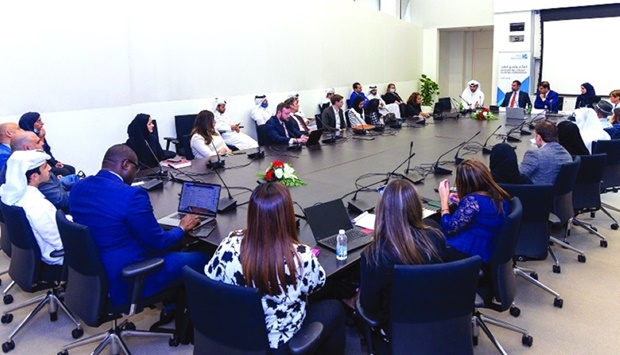Hamad Bin Khalifa University (HBKU)’s College of Law recently organised a seminar examining the legal framework and key issues associated with Qatar’s hosting of the 2022 FIFA World Cup.
Chaired by Dr Zachary Calo, professor at the College of Law, the discussion brought together a panel of influential legal experts working toward the success of the mega-event.
The panelists included Aarij S Wasti, legal director of the FIFA World Cup Qatar 2022, Salman al-Ansari, partner at Al-Ansari and Associates, and Khadeja al-Zarraa, senior associate at Al-Ansari and Associates, as well as Dr Despina Mavromati, Attorney at SportLegis Lausanne, a specialised sport law and arbitration practice.
Reviewing the pivotal legislative mechanism, Law No. 10 of 2021, which constitutes an enabling framework for Qatar’s commitments to host the FIFA World Cup, the speakers discussed the key national laws that have been enacted to support the event. They also reflected on Qatar’s achievements in implementing international best practices to settle sports-related disputes, and ultimately, the nature of the event’s legal legacy.
Dean Susan L Karamanian, College of Law, said: “The session provided unique insights into Qatar’s legal obligations as set out in the original bid documents and follow on agreements and how the country engaged key stakeholders to establish a comprehensive framework to meet the obligations, as well as those likely to arise due to the games. The FIFA World Cup is exceptional, both in its scale and the substantial investments by Qatar and its private sector. The key lesson from the session is that the FIFA World Cup 2022 has markedly transformed Qatar’s legal system well beyond sports, particularly as to infrastructure, procurement, labour, transparency, and sustainability.”
Dr Calo, who teaches sports law at HBKU, including a course titled 'Navigating Legal and Commercial Aspects of Sports' through the edX platform, said: “The seminar presented an opportunity to exchange expertise on how the FIFA World Cup is set to shape sports law and the law, in general, in the coming years, from both an academic and practitioner point of view. We thank our speakers and participants for their insights, which highlighted important areas relevant to Qatar’s current preparations, as well as its readiness to play a role in international sports law beyond the World Cup – in terms of business and arbitration.”
Chaired by Dr Zachary Calo, professor at the College of Law, the discussion brought together a panel of influential legal experts working toward the success of the mega-event.
The panelists included Aarij S Wasti, legal director of the FIFA World Cup Qatar 2022, Salman al-Ansari, partner at Al-Ansari and Associates, and Khadeja al-Zarraa, senior associate at Al-Ansari and Associates, as well as Dr Despina Mavromati, Attorney at SportLegis Lausanne, a specialised sport law and arbitration practice.
Reviewing the pivotal legislative mechanism, Law No. 10 of 2021, which constitutes an enabling framework for Qatar’s commitments to host the FIFA World Cup, the speakers discussed the key national laws that have been enacted to support the event. They also reflected on Qatar’s achievements in implementing international best practices to settle sports-related disputes, and ultimately, the nature of the event’s legal legacy.
Dean Susan L Karamanian, College of Law, said: “The session provided unique insights into Qatar’s legal obligations as set out in the original bid documents and follow on agreements and how the country engaged key stakeholders to establish a comprehensive framework to meet the obligations, as well as those likely to arise due to the games. The FIFA World Cup is exceptional, both in its scale and the substantial investments by Qatar and its private sector. The key lesson from the session is that the FIFA World Cup 2022 has markedly transformed Qatar’s legal system well beyond sports, particularly as to infrastructure, procurement, labour, transparency, and sustainability.”
Dr Calo, who teaches sports law at HBKU, including a course titled 'Navigating Legal and Commercial Aspects of Sports' through the edX platform, said: “The seminar presented an opportunity to exchange expertise on how the FIFA World Cup is set to shape sports law and the law, in general, in the coming years, from both an academic and practitioner point of view. We thank our speakers and participants for their insights, which highlighted important areas relevant to Qatar’s current preparations, as well as its readiness to play a role in international sports law beyond the World Cup – in terms of business and arbitration.”

